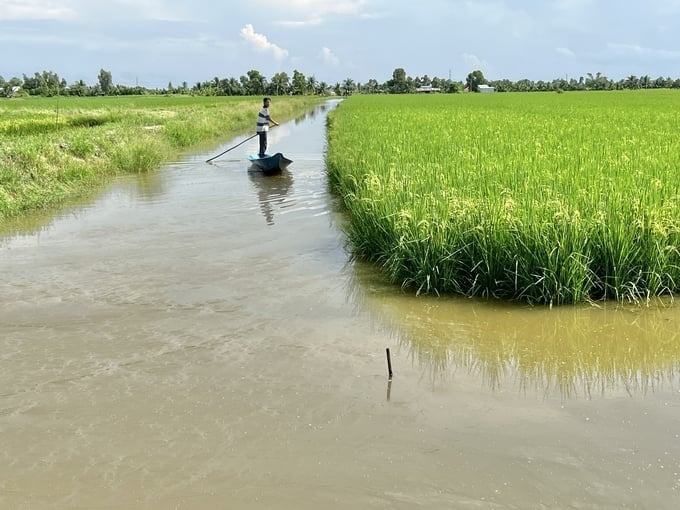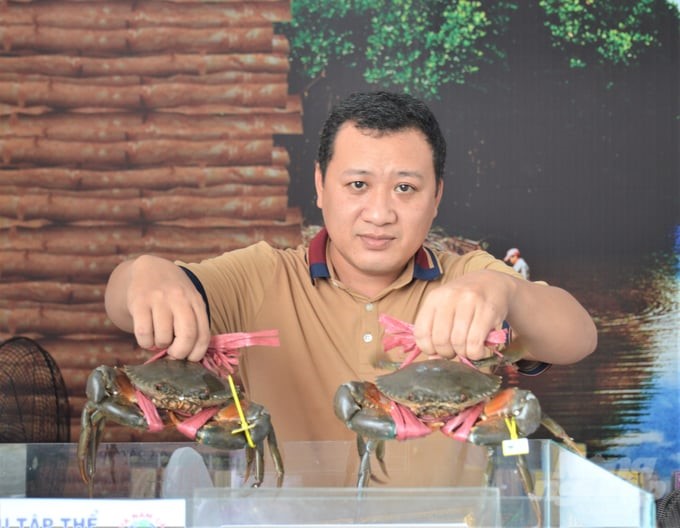June 19, 2025 | 12:02 GMT +7
June 19, 2025 | 12:02 GMT +7
Hotline: 0913.378.918
June 19, 2025 | 12:02 GMT +7
Hotline: 0913.378.918
The Ca Mau Provincial People's Council has just issued a resolution regulating the content and level of spending from the local budget for developing seed production to serve the restructuring of the agriculture sector in the period 2023–2030.
Ca Mau is a locality with a high proportion of an agricultural economy, in which breeds are an important factor in forming market-oriented agricultural production, serving exports, and adapting to climate change.

Ca Mau province has issued a project “Develop seed production to serve the restructuring of the agriculture sector in Ca Mau province for the period 2023–2030”. Photo: Trong Linh.
Previously, the Ministry of Finance issued Circular No. 107/2021/TT-BTC regulating the management, use, and settlement of non-business expenditures to perform the task of developing seed production in the Program "Seed Research, Development, and Production to serve the restructuring of the agriculture sector in the period 2021–2030".
The Circular stipulates that the Provincial People's Committee submits to the Provincial People's Council for approval the content of which the state budget ensures funding or partially supports the implementation of projects to develop the production of national key varieties and other varieties according to Decision No. 703/QD-TTg of the Prime Minister at the locality, in accordance with the locality’s ability to balance the budget.
Mr. Huynh Quoc Viet, Chairman of the Ca Mau Provincial People's Committee, said that the introduction of the resolution aims to concretize the Central’s document assigning localities to promulgate detailed regulations suitable to the conditions and capabilities of balancing local resources. At the same time, the resolution aims to meet the goal of improving the capacity for researching and producing plant and animal varieties in an industrial and modern direction to provide seed production with productivity, quality, and adaptation to climate change. Thereby contributing to successfully restructuring the agriculture sector, increasing added value, and achieving sustainable development in the period 2021–2030.
In fact, Ca Mau province has issued a project, “Develop seed production to serve the restructuring of the agriculture sector in Ca Mau province for the period 2023–2030,” to serve as a basis for determining the list of national key varieties in the province and other varieties that need to focus on investment and development to serve agricultural production.
According to the general estimate of the above-mentioned project, the capital need from the non-business expenditure source to support the implementation of seed production development projects is about VND 62 billion, of which VND 29 billion is for the period 2023–2025 and more than VND 33 billion is for the period 2023–2025.

The Ca Mau crab brand is famous at home and abroad. Photo: TL.
According to the resolution, the subjects receiving funding and partial financial support include state management agencies and public non-business units that have functions and tasks of managing, researching, and producing agricultural and forestry plant seeds, livestock seeds, and seafood seeds; and businesses, cooperatives, cooperative groups, households, and individuals researching and producing seeds.
To be more specific, students participating in seed development training classes without receiving a salary from the state budget are supported with meals of VND 150,000/person/day; travel of VND 200,000/person/course if the training location is 15km or more away from their residence.
In particular, as for the disabled and learners residing in communes in difficult or particularly difficult areas and island communes, the support level for travel is VND 300,000/ person/course if the training location is 5km or more away from their residence; and the accommodation support level is VND 200,000 /person/day.
The project “Develop seed production to serve the restructuring of the agriculture sector in Ca Mau province for the period 2023–2030” has identified nine national key agricultural varieties in the province, including giant tiger prawn and whiteleg shrimp, rice, banana, pig, chicken, duck, hybrid acacia, cajuput, and mangrove, and five other agricultural varieties, including giant freshwater prawn, sea crab, blood clam, freshwater fish, and salt-brackish water fish.
The Ca Mau Provincial People's Committee has currently issued a decision approving the projects “Develop blood clam products in the area until 2030” and "Develop the sustainable crab industry in Ca Mau province until 2030”. Accordingly, the project set a target of researching and developing the process of producing artificial blood clam seeds to be proactive by 40% of blood clam seed sources in the entire province until 2025 and 80% until 2030.
Regarding the crab project, by 2025, the crab seed production capacity will reach about 1.25 billion heads/year, meeting 100% of farming needs; the rest will be sold outside the province. By 2030, the crab seed production capacity will reach about 1.4 billion heads/year.
Translated by Huyen Vu Thu

(VAN) After 5 years of implementation, the CAI initiative has helped coffee growers change their farming practices, moving toward responsible agriculture that meets global export standards.

(VAN) The primary prerequisite for the comprehensive and robust integration of Vietnam's livestock sector into the global value chain is the establishment of a disease control system.

(VAN) The results of national programs are essential for establishing a contemporary livestock sector that is well-equipped to meet the demands of both domestic and international markets, with robust biosafety standards.

(VAN) The UNESCO Global Geopark revalidation of Non nuoc Cao Bang and the transition to a two-tier administrative model are presently undergoing a pivotal moment in Cao Bang, the northernmost province of Vietnam.
/2025/06/13/5330-2-004539_953.jpg)
(VAN) Changing policy mindset and removing investment barriers are urgent requirements to open up new development space for enterprises in the agricultural sector.

(VAN) The areas include the restoration of five million hectares of marine ecosystems.

(VAN) Dr. Le Van Nguyen, Director of the Institute of E-Commerce Management (ECM), emphasizes the potential for green development through the cultivation of fruit trees, particularly in provinces such as Son La.